上海公示语翻译
- 格式:doc
- 大小:40.50 KB
- 文档页数:3
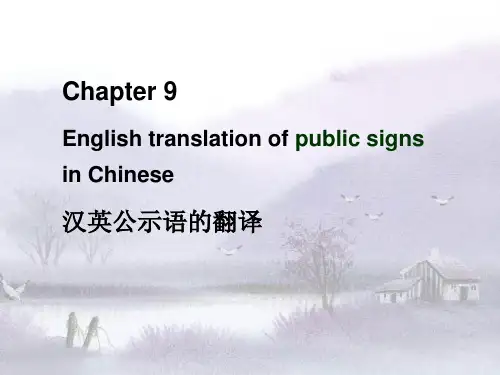
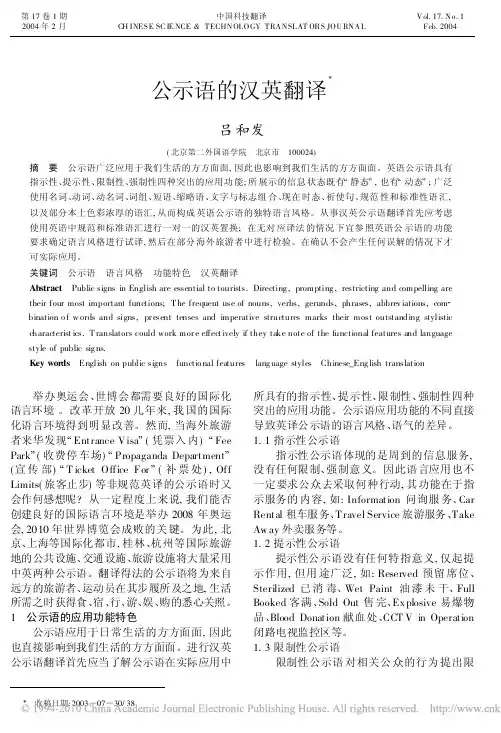
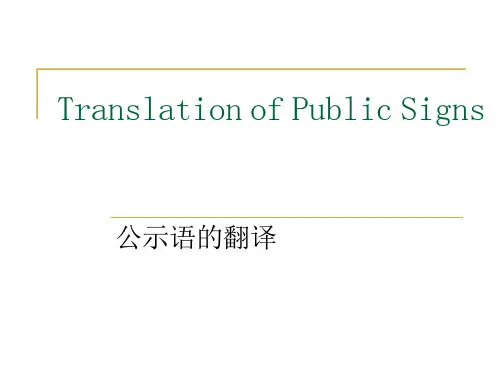
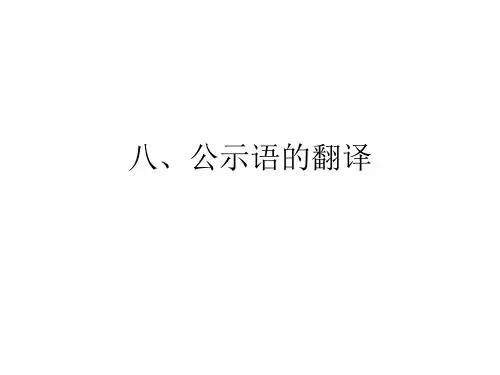

城市公示语英译1. 引言城市公示语是城市中常见的一种文字表达形式,通过悬挂在城市街头、广场、公园等地方的标语牌或广告牌上,向市民和游客传达相关信息。
这些公示语通常以简洁、生动的方式呈现,旨在吸引人们的注意,并有效地传达特定信息。
本文将探讨城市公示语的英译问题,包括常见翻译策略和技巧,并提供一些例子进行说明。
2. 常见翻译策略2.1 直译法直译法是最基本的翻译策略之一,即将源语言(中文)直接翻译成目标语言(英文),尽量保持原汁原味。
在城市公示语的英译中,这种方法可以较好地保留原始信息,但有时可能会产生不够自然流畅或难以理解的表达方式。
例如:•中文:欢迎光临我们美丽的城市!英文:Welcome to our beautiful city!2.2 意译法意译法是指根据源语言文本所要表达的意思,在目标语言中找到合适的表达方式。
这种方法在城市公示语的英译中常常被使用,因为它可以更好地传达信息,并且使翻译更加自然。
例如:•中文:绿色出行,共享未来!英文:Green travel, share the future!2.3 增译法增译法是指在翻译过程中,根据目标语言的表达习惯和需要,对源语言文本进行适当的增补或补充。
这种方法在城市公示语的英译中常常被使用,以便更好地传达信息。
例如:•中文:请保持环境整洁英文:Please keep the environment clean and tidy3. 翻译技巧3.1 注意上下文在进行城市公示语的英译时,要注意上下文信息。
有时候一个短语或句子可能在单独看时很难理解,但放在特定背景下就能明白其含义。
因此,在进行翻译时要充分考虑上下文,并尽量还原原始信息。
例如:•中文:爱护花草树木英文:Take good care of flowers, plants, and trees3.2 简洁明了城市公示语通常以简洁明了的方式表达信息,因此在翻译时要尽量遵循这一原则。
过于冗长的翻译可能会使信息不够清晰,甚至失去吸引力。
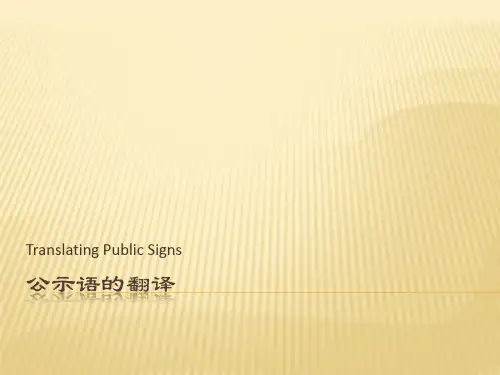
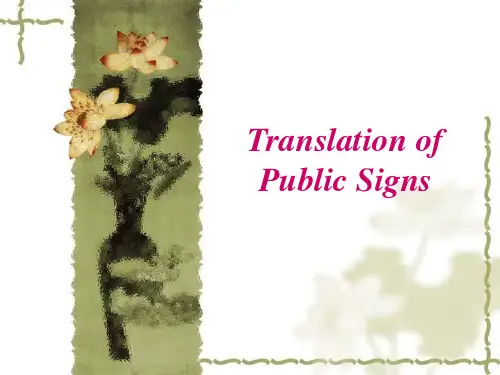
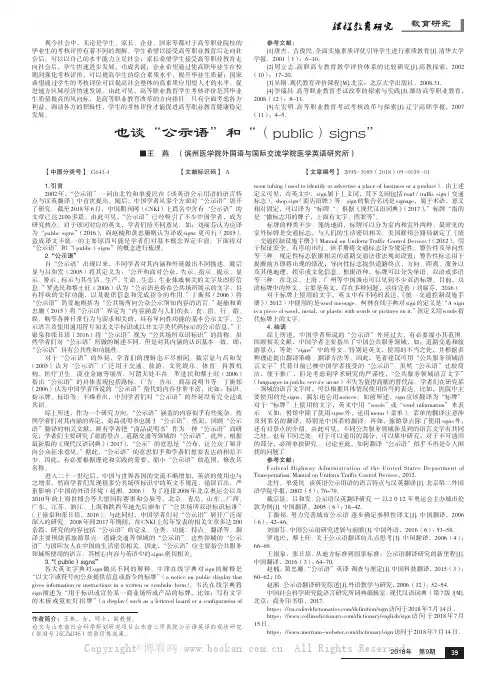
教育研究现今社会中,无论是学生、家长、企业、国家等都对于高等职业院校的毕业生的考核评价有着不同的理解。
学生希望以接受高等职业教育后走向社会后,可以以自己的水平能力立足社会;家长希望学生接受高等职业教育走向社会后,学生快速进步发展,功成名就;企业希望通过使高职毕业生在校期间强化考核评价,可以提高学生的综合素质水平,提升毕业生质量;国家希望通过学生的考核评价可以提高社会整体的高素质应用型人才的水平,促进地方区域经济快速发展。
由此可见,高等职业教育学生考核评价是其毕业生质量提高的风向标,是高等职业教育改革的方向指针。
只有全面考虑各方利益,调动各方的积极性,学生的考核评价才能促进高等职业教育健康稳定发展。
参考文献:[1]唐杰,吉俊民.全面实施素质评优引导学生进行素质教育[J].清华大学学报,2001(1):6-10.[2]周立志.高职高专教育教学评价体系的比较研究[J].高教探索,2002(10):17-20.[3]吴钢.现代教育评价课程[M].北京:北京大学出版社,2008.31.[4]李瑞昌.高等职业教育考试改革的探索与实践[J].潍坊高等职业教育,2008(12):8-11.[5]左宏明.高等职业教育考试考核改革与探索[J].辽宁高职学报,2007(11):4-5.1.引言2002年,“公示语”一词由北竹和单爱民在《谈英语公示用语的语言特点与汉英翻译》中首次提出。
随后,中国学者从多个方面对“公示语”展开了研究。
截至2018年6月,中国期刊网(CNKI)上篇名中含有“公示语”的文章已达2100多篇。
由此可见,“公示语”已经吸引了不少中国学者,成为研究热点。
对于该词对应的英文,学者们持不同意见。
如:刘丽芬认为应译为“public signs”(2016),而赵楠和黄忠廉则认为译成signs 更可行(2015)。
造成译文不统一的主要原因可能是学者们对基本概念界定不清。
下面将对“公示语”和“(public)signs”的概念进行梳理。
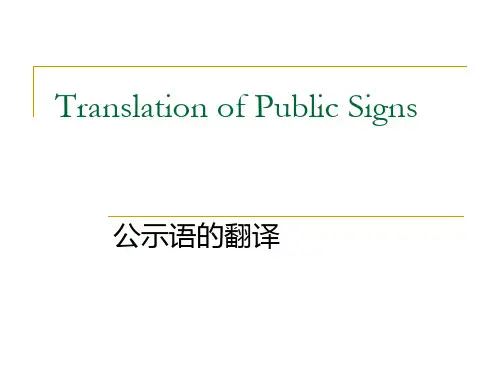
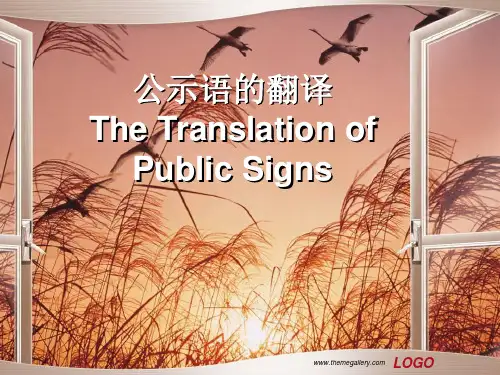

[收稿日期]2010-01-22[作者简介]束慧娟,苏州大学外国语学院讲师,学术方向:翻译理论与实践,系统功能语言学檿檿檿檿檿檿檿檿檿檿檿檿檿檿檿檿檿檿檿檿檿檿檿檿檿檿檿檿檿檿檿檿檿檿檿檿檿檿檿檿檿檿檿檿檿檿。
5.利用词的韵味增强表达的生动性将词汇的原始意义引申运用,在内涵上可激发读者丰富的联想,但利用词汇的搭配所产生的韵味和节奏也同样具有十分生动的效果。
英语中具有很多这类固定搭配的词汇,如forgive and forget ,tit-for-tat ,helter-skelter ,brain-drain 等,在英语运用中,通过恰当的选词而创造出的韵味能达到生动的效果,如:这个时代有些人贫困潦倒,而有些人腰缠万贯。
This is an age of both poverty and plenty.他四肢发达,头脑简单。
He has more brawn than brain.面临经济危机的时候,教育产业反而兴旺。
Economic recession looms ,but education booms.他一夜间从默默无闻成为英雄人物。
He rose from zero to hero overnight.我们应该以乐观的态度对待生活的压力。
We should face pressure with pleasure.经济萧条的时候,失业的人多,而找到工作的人少。
In the economic slump there is more firing than hiring.房地产业兴起了一阵子,随之马上出现了萧条。
The housing market boomed and then busted.参考文献:方梦之.译学词典[Z ].上海:上海外语教育出版社,2004.本文材料来源:主要来自China Daily 、Shanghai Daily 、New York Times 和Reader ’Digest 等报刊和杂志。
Shanghai has been trying to harness English translations that sometimes wander, lik e “cash recyling machine.”By ANDREW JACOBSPublished: May 2, 2010SHANGHAI —For English speakers with subpar Chinese skills, daily life in China off ers a confounding array of choices. At banks, there are machines for “cash withdra wing” and “cash recycling.” The menus of local restaurants might present such dele ctables as “fried enema,” “monolithic tree mushroom stem squid” and a mysterious thirst-quencher known as “The Jew’s Ear Juice.”Those who have had a bit too much monolithic tree mushroom stem squid could fi nd themselves requiring roomier attire: extra-large sizes sometimes come in “fatso” or “lard bucket” categories. These and other fashions can be had at the clothing ch ain known as Scat.Go ahead and snicker, although by last Saturday’s opening of the Expo 2010in Sha nghai, drawing more than 70 million visitors over its six-month run, these and other uniquely Chinese maladaptations of the English language were supposed to have b een largely excised.Well, that at least is what the Shanghai Commission for the Management of Langua ge Use has been trying to accomplish during the past two years.Fortified by an army of 600 volunteers and a politburo of adroit English speakers, t he commission has fixed more than 10,000 public signs (farewell “Teliot” and “urine district”), rewritten English-language historical placards and helped hundreds of rest aurants recast offerings.The campaign is partly modeled on Beijing’s herculean effort to clean up English sig nage for the 2008 Summer Olympics, which led to the replacement of 400,000 stre et signs, 1,300 restaurant menus and such exemplars of impropriety as the Dongda Anus Hospital —now known as the Dongda Proctology Hospital. Gone, too, is Raci st Park, a cultural attraction that has since been rechristened Minorities Park.“The purpose of signage is to be useful, not to be amusing,” said Zhao Huimin, the former Chinese ambassador to the United States who, as director general of the c apital’s Foreign Affairs Office, has been leading the fight for linguistic standardization and sobriety.But while the war on mangled English may be considered a signature achievement of government officials, aficionados of what is known as Chinglish are wringing their hands in despair.Oliver Lutz Radtke, a former German radio reporter who may well be the world’s fo remost authority on Chinglish, said he believed that China should embrace the fanci ful melding of English and Chinese as the hallmark of a dynamic, living language. A s he sees it, Chinglish is an endangered species that deserves preservation.“If you standardize all these signs, you not only take away the little giggle you get while s trolling in the park but you lose a window into the Chinese mind,” said Mr. Radtke, who is the author of a pair of picture books that feature giggle-worthy Chi nglish signs in their natural habitat.Lest anyone think it is all about laughs, Mr. Radtke is currently pursuing a doctoral degree in Chinglish at the University of Heidelberg.Still, the enemies of Chinglish say the laughter it elicits is humiliating. Wang Xiaomi ng, an English scholar at the Chinese Academy of Social Sciences, painfully recalls t he guffaws that erupted among her foreign-born colleagues as they flipped through a photographic collection of poorly written signs. “They didn’t mean to insult me bu t I couldn’t help but feel uncomfortable,” said Ms. Wang, who has since become on e of Beijing’s leading Chinglish slayers.Those who study the roots of Chinglish say many examples can be traced to lazine ss and a flawed but wildly popular translation software. Victor H. Mair, a professor of Chinese at the University of Pennsylvania, said the computerized dictionary, Jings han Ciba, had led to sexually oriented vulgarities identifying dried produce in Chines e supermarkets and the regrettable “fried enema” menu selection that should have b een rendered as “fried sausage.”Although improved translation software and a growing zeal for grammatically unassai lable English has slowed the output of new Chinglishisms, Mr. Mair said he still rece ived about five new examples a day from people who knew he was good at deciph ering what went wrong. “If someone would pay me to do it, I’d spend my life stud ying these things,” he said.Among those getting paid to wrestle with Chinglish is Jeffrey Yao, an English transl ator and teacher at the Graduate Institute of Interpretation and Translation in Shan ghai who is leading the sign exorcism. But even as he eradicates the most egregiou s examples by government fiat —businesses dare not ignore the commissi on’s sugg ested fixes —he has mixed feelings, noting that although some Chinglish phrases s ound awkward to Western ears, they can be refreshingly lyrical. “Some of it tends t o be expressive, even elegant,” he said, shuffling through an online catalog of si gns that were submitted by the volunteers who prowled Shanghai with digital cameras.“They provide a window into how we Chinese think about language.”A Sampling of ChinglishHe offered the following example: While park signs in the West exhort people to “K eep Off the Grass,” Chinese versions tend to anthropomorphize nature as a way to gently engage the stomping masses. Hence, such admo nishments as “The Little Gra ss Is Sleeping. Please Don’t Disturb It” or “Don’t Hurt Me. I Am Afraid of Pain.”Mr. Yao read off the Chinese equivalents as if savoring a Shakespearean sonnet. “H ow lovely,” he said with a sigh.He pointed out that this lingui stic mentality helped create such expressions as “long time no see,” a word-for-word translation of a Chinese expression that became a mainstay of spoken English. But Mr. Yao, who spent nearly two decades working as a translator in Canada, has his limits. He showed a sign from a park designed to provide visitors with the rules for entry, which include prohibitions on washing, “sca venging,” clothes drying and public defecation, all of it rendered in unintelligible —and in the case of the last item —rather salty English. The sign ended with this h umdinger: “Because if the tourist does not obey the staff to manage or contrary ho lds, Does, all consequences are proud.”Even though he had had the sign corrected recently, Mr. Yao could not help but sh ake his head in disgust at the memory. And he was irritated to find that a raft of t roublesome sign verbiage had slipped past the commission as the expo approached, including a cafeteria sign that read, “The tableware reclaims a place.” (Translation: drop off dirty dishes here.)“Some Chinglish expressions are nice, but we are not translating literature here,” he said. “I want to see people nodding that they understand the message on these si gns. I don’t want to see them laughing.”。